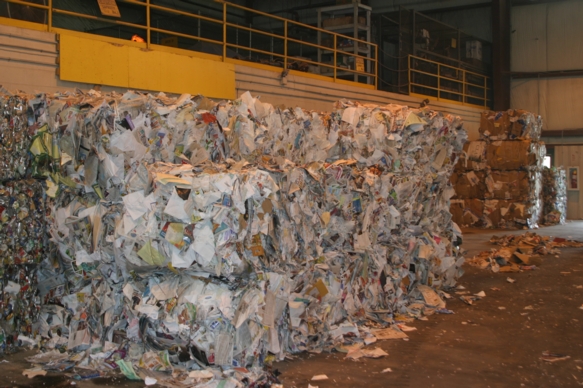Thanks for the interesting blog. The trouble with charging money for garbage disposal is that some people will throw it in a ditch or some company's dumpster rather than pay the fee, so litter is the trade off. I live in a province where beverage bottles and cans, and tires have a deposit or environmental fee required upon purchase. It does work great as everyone wants their money back, or if it is tossed, someelse sees it as money and will pick it up and recycle it.
Blog Post
Saving Energy by Recycling


Nationally, our recycling rate is 30.6% (it's about 17% in Brattleboro, Vermont), and that recycling saves the country roughly 1.5 quads of energy per year, according to the report (one quad is equal to one quadrillion or thousand-trillion Btus), or about 1.5% of our nation's total annual energy consumption. Boosting the national recycling rate to 35% would increase the total savings by another 0.23 quads--an amount equivalent to nearly 41 million barrels of crude oil. That's over ten times the highest estimate of the amount of oil that has entered the Gulf of Mexico from BP's Deepwater Horizon spill during the last two months--not an insignificant amount of energy savings! Recycling not only saves energy, it also preserves natural resources and reduces pollution. A ton of virgin paper requires about 20 trees, and Americans use, on average, 730 pounds of paper (about a third of a ton) per year. Virgin aluminum is made from bauxite, much of which is mined in ecologically fragile regions, such as Brazil's rainforests. Copper is produced from deep, open-pit mines around the world that create some of the worst water pollution anywhere. The processing of all these materials generates huge quantities of air pollution. 
The easiest way to encourage recycling is to make it economically attractive to do so, and the easiest way to do that is to charge people for throwing away trash. That's the intent of pay-as-you-throw (PAYT) municipal waste programs, such as the program being considered for Brattleboro. When we pay a flat fee for trash collection, we don't have an incentive to generate less trash and recycle more. Paying a flat fee for trash pick-up (whether that fee is hidden in property taxes, like in Brattleboro, or paid directly) is sort of like paying a flat fee for heat. Think about it. If I didn't pay more when I use more heating oil, I wouldn't have a financial incentive to tighten up my house or use a setback thermostat at night. That's the fundamental flaw with standard trash collection; we don't have any incentive to produce less. 
Putting market forces to work with PAYT would not only increase recycling rates, but it might also encourage us to buy stuff with less packaging and to avoid throw-away paper plates and plastic utensils. It's great when people want to save energy because it's the right thing to do (helping the environment, reducing our nation's dependence on foreign oil, etc.), but to change the habits of a lot of people we need to make it economically attractive to do so. That's why PAYT makes so much sense. Establish a price for waste generation, and let market forces change our habits. I invite you to share comments on this blog. Any experience to share on how PAYT works in your community? Alex Wilson is the executive editor of Environmental Building News and founder of BuildingGreen, LLC. To keep up with his latest articles and musings, you can sign up for his Twitter feeds. Photos of the Brattleboro, Vermont Materials Recovery Facility (MRF), taken by Alex Wilson.
Published June 23, 2010 Permalink Citation
(2010, June 23). Saving Energy by Recycling. Retrieved from https://www.buildinggreen.com/blog/saving-energy-recycling
Comments
I really like the idea of imp
I really like the idea of implementing programs like PAYT to encourage people to decrease waste on a personal level. If I know I'm going to have to pay a certain amount per pound of trash I produce, it's like I'll a)try to reduce that amount significantly, and b) try to reuse or recycle as much of that waste as possible. Why isn't this happening everywhere? In my own community we have both trash and recycling pick-up, with each bin being equal in size. While this is a start, the bins are huge and it's not uncommon to see them both packed to the brim. The cost is included in our association fees as a flat rate, so while I try to minimize my waste (due to my own environmental conscienceness), I'm still paying the same amount for waste pick-up as my over-consuming neighbors. I couldn't agree more that the best way to encourage action is through peoples' pocketbooks.
Similarly, programs in some countries and states utilize deposit programs on resource & energy-itensive materials that can easily be recycled, such as a aluminum cans and glass bottles. This program works wonders for encouraging people to recycle because if they return the cans or bottles they get their money back. As an added bonus, regions with these programs are generally free from litter because if someone sees a can or bottle on the side of the road, they're likely to pick it up, return it, and pocket the money. What a great idea!
These programs make sense, and as your article presents, save money, energy, and our environment. Thanks for a great article!



Add new comment
To post a comment, you need to register for a BuildingGreen Basic membership (free) or login to your existing profile.